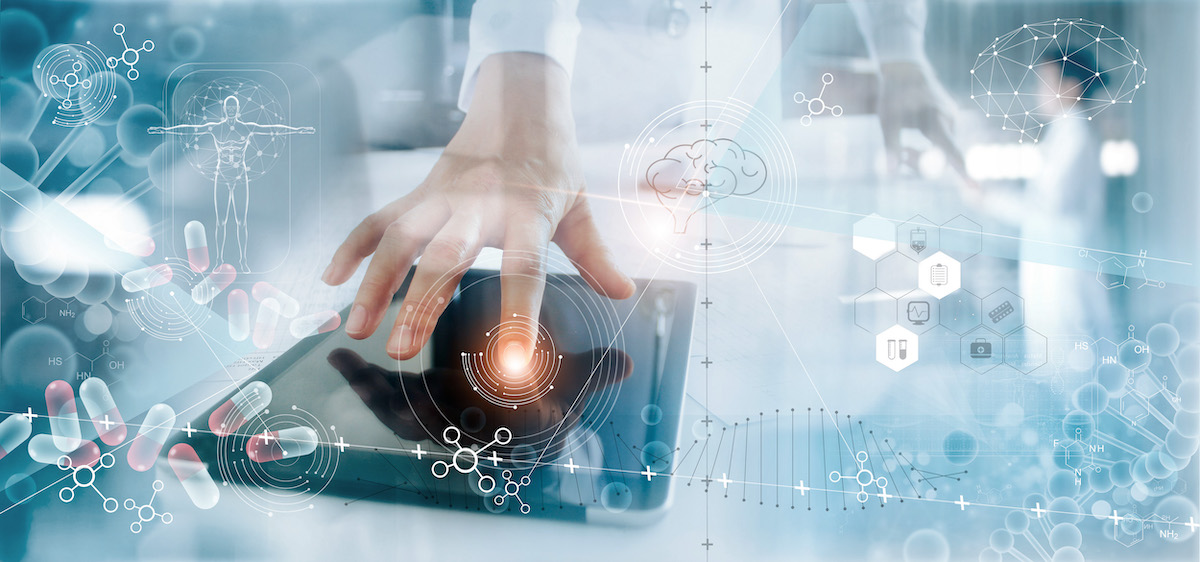As Chief Technology Officer at Skyscanner Alistair Hann helped build Scotland’s first ‘unicorn’ – but with a doctorate in monitoring patient care, he’s now developing a digital platform for the NHS.
What drew you to your new role and how are you enjoying it? From a tech ‘unicorn’ to the NHS is quite an unexpected move!
I have long been interested in how technology can improve care. The subject of my doctorate was patient monitoring in high dependency care in hospitals – we were using machine learning to produce alarms that gave earlier warning of when patients were deteriorating and had fewer ‘false alarms’ than existing systems.
After leaving Skyscanner, I was looking for an opportunity to get back into developing products in healthcare and I looked at whether there were start-ups in Scotland I could help, or whether to found something. Then,somewhat out of the blue, I heard about the Digital Health and Care Strategy and the opportunity to build a National Digital Platform for Scotland. That ticked my boxes in terms of health care, Scotland, and a challenge!
What expertise and experience are you bringing to the challenge?
Skyscanner taught me a lot about how to grow teams, design big software systems, and deliver valuable products that consumers love. While online travel seems miles away from healthcare, there are some similar challenges such as data locked into proprietary silos. Of course, healthcare is a much more complicated domain with a broader group of stakeholders, and I got a chance to work in that environment during my doctorate. Having founded my own company,worked in a healthcare start-up, and advised other start-ups I am familiar with having to build something from nothing and we are recruiting a new team from scratch to deliver this.
Can you describe the size and scope of the project for the National Digital Platform and the implementation timescales?
The scope of the platform is all of health and social care in Scotland – so that’s GP practices, hospitals, social care and, critically, citizens being able to control their own data. There’s also the mandate to provide data for research and to improve health and social care services. A traditional approach would have been to spend years and millions of pounds capturing requirements for that, and then more years building the system. That approach is outdated, as the telephone book of requirements is rarely what is needed at the time the product arrives. Our timescales are very different, we are delivering a series of products powered by the platform, the first of which will be ready early next year. With each product release we will learn more about user needs and can quickly respond to feedback. It will be years until we are able to entirely replace the whole system – for example, there are fourteen territorial health boards with hundreds of systems each – but we will be delivering value and improving care from the start.
Why can’t we access our medical records online already when virtually every facet of life has been digitised, from online banking to travel and retail? How far away are we realistically from being able to do that?
Technically, this is a relatively straightforward problem to solve– in other parts of life, such as online banking, we have determined how to use technology to share records and notifications securely online. The bigger challenges arise when it comes to getting a health benefit from sharing medical records – how do you get people do take action that will improve their health or quality of care as a result of getting access to the information? The way the information is captured needs to change as well – writing things in away that can be understood by everyone, for example, describing a condition as‘persisting for a long time’ rather than ‘chronic’ (which might trigger panic!). There can be some resistance to sharing patient notes and concerns about it causing additional work and unnecessary worry, but trials of doing this elsewhere have consistently shown these concerns not to be warranted.
What would the benefits be, to individual patient health, to the NHS, and to society in general?
By getting the right information available to clinicians and care workers at the point of care, we can help them make better decisions and provide better care. We can also free up time for those workers so that they can spend more of their time caring – and less time entering data or wrestling with IT. Citizen access to records enables people to get more involved in their care from big things such as self-management of long-term conditions to smaller things like finding out sooner about a test result. The big value to society comes from using the platform to better understand how the system works and how specific disease pathways work. Producing consistent, high quality data – anonymised and protected – that the NHS can use to improve services, and scientists can use for work such us understanding which medications work for which people and identifying new cures. All of those things feedback into better care and outcomes.
Download a PDF of FutureScot Magazine in The Times Scotland 15.12.18.




